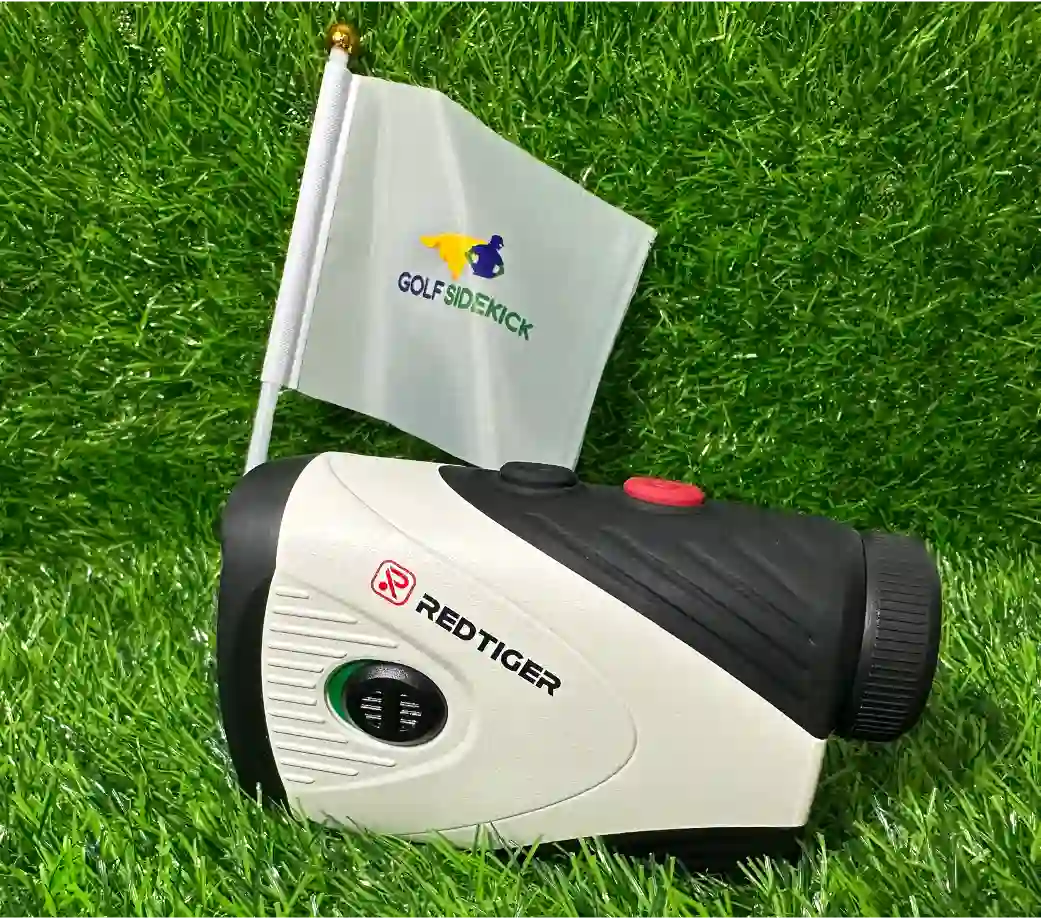Last Updated on February 4, 2024 by Matt Greene
*Read our review guidelines.
Plenty of rangefinder companies offer affordable price-points while still featuring the same high-end materials and strong construction as their pricier counterparts.
For our best budget golf rangefinder guide, we’ve selected rangefinders based on factors like quality construction, accuracy of the readings, speed of use and of course, the price.
Looking for more information about the top rangefinders sold today? Our guide to thebest rangefinders in golf of 2024 includes a handful of budget-friendly options. The 9 cheap rangefinders features in this guide are the best available and I know because I bought all of them.
The best budget laser golf rangefinder is the Voice Caddie L6.
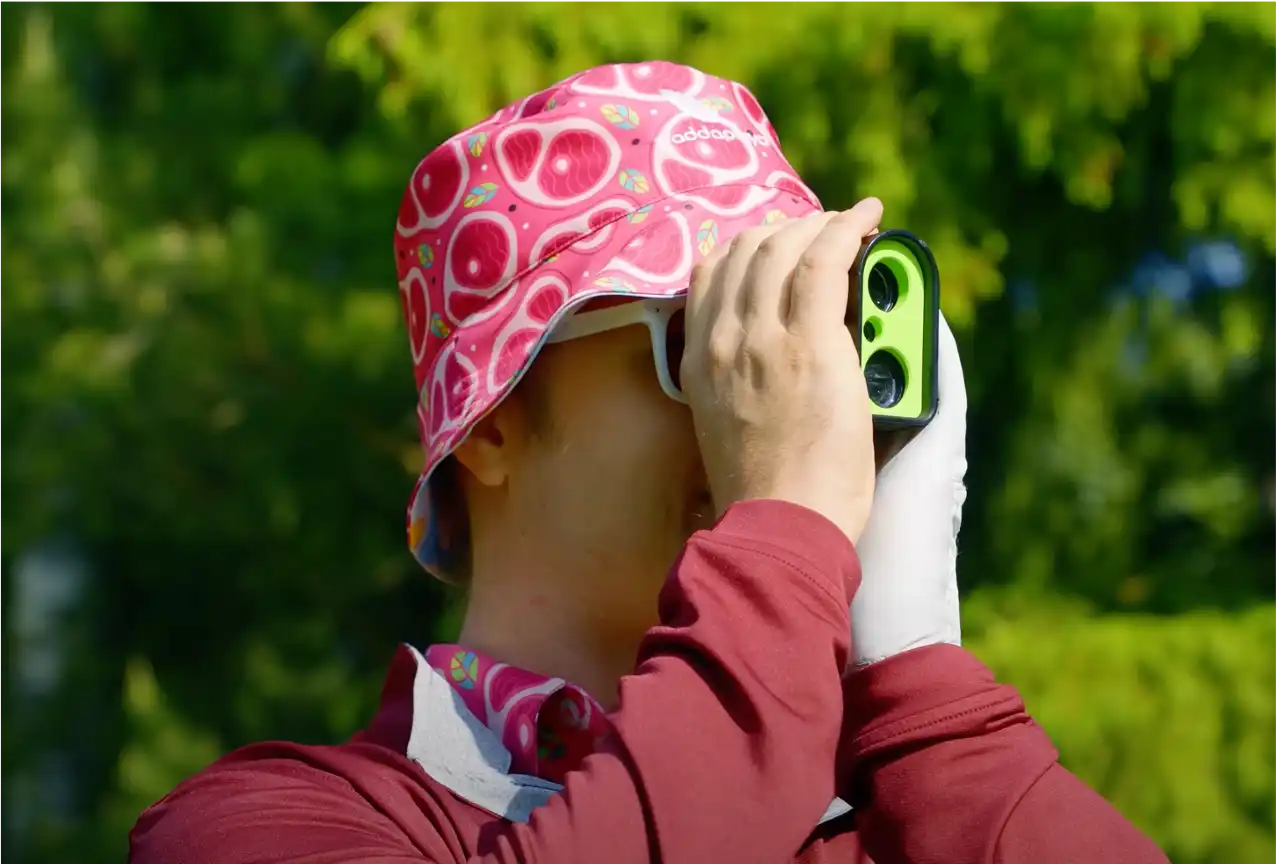
Best Budget Golf Rangefinder in 2024
The best rangefinder overall
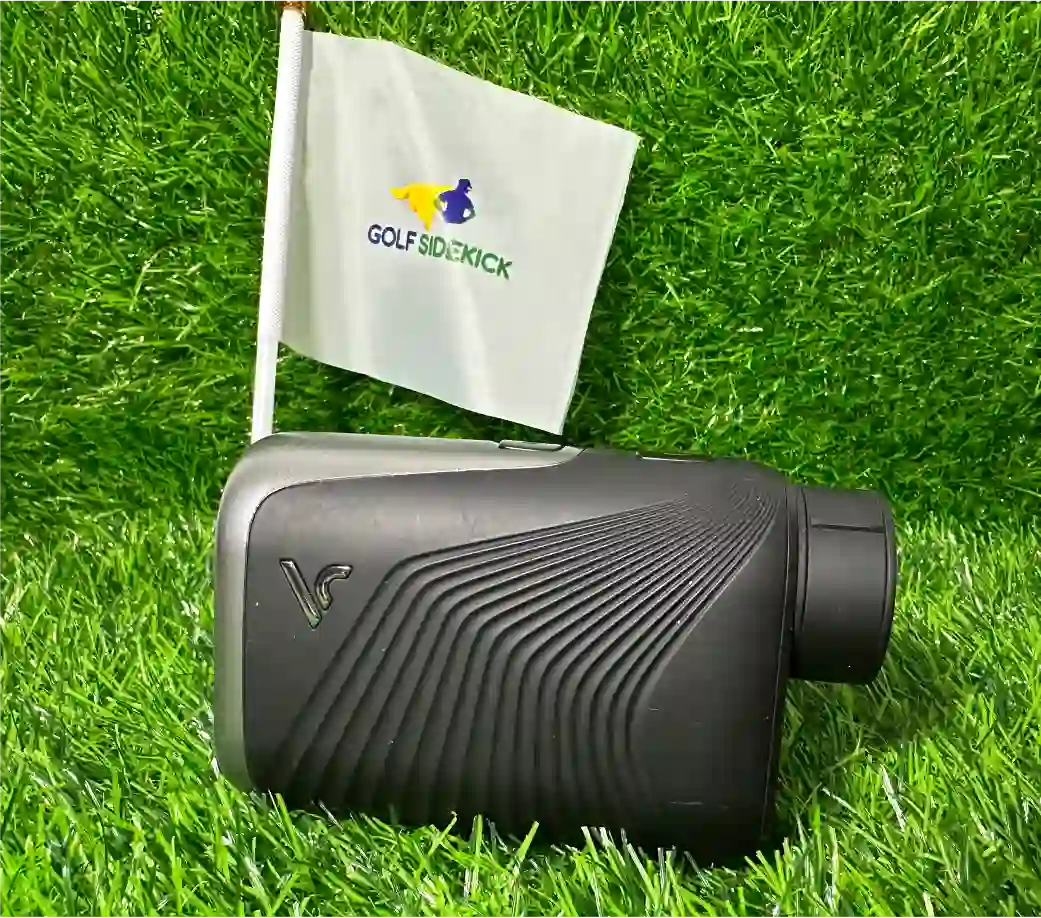
Voicecaddie L6 rangefinder
Just click, discount applied
Speed
Optics
Accuracy
The Voice Caddie L6 rangefinder is my rangefinder of choice and it is the best golf rangefinder for the money hands down.
There are many reasons I like this rangefinder but the number one reason is it reads distances faster than most rangefinders and from further away than any rangefinder on earth.
Voice Caddie have gone through iteration after iteration and the L6 improves on the prior L5 model in speed and optics. This is their most precise model so far. I have never been able to shoot distances from over 250 yards with Bushnells. The Voice Caddie is one of only two models I am able to get a flag from 300 yards away.
The new red display is different from the L5 and it is my favorite part of the rangefinder. It's so easy to see the numbers even in the bright of day or the early mornings with low light.
I prefer the way you can switch slope feature on and off with the L6. I just press the M button and it toggles on and off. I don't like decimal points when a rangefinder displays the number, and the L6 has decimal points only on slope mode. The decimal disappears on normal mode.
My experience with the Voice Caddy L6
I have tested the L6 against every rangefinder I use regularly including Bushnell, the industry standards.
- Every distance I measure with the Voice Caddie L6 is identical to the Bushnell.
- The Bushnells cannot pick up distances to pins from over 240 yards but the L6 can, and it does it within 1 or 2 attempts.
- The bullseye and crosshairs of the L6 are among the best I've seen in any rangefinder to pick up small targets.
- I picked up the distances extremely quickly - as quick as a Bushnell without a doubt.
- It's easy to carry the rangefinder in your pocket because it's compact enough.
Because I have used so many rangefinders, accurate numbers didn't surprise me but I was surprised how accurate AND FAST the rangefinder is. I didn't struggle to hit the target and rarely had to shoot a distance more than once. The vibration when you hit the target is pleasant without feeling like an earthquake is hitting you either. I like this model and it is my gamer.
The Voice Caddie L6 is compact and the build quality is top notch. There's a 30 day full refund guarantee if you don't like it. That's a winner. For $200, you will not find a better rangefinder in the world.
Cons
The best possible optics
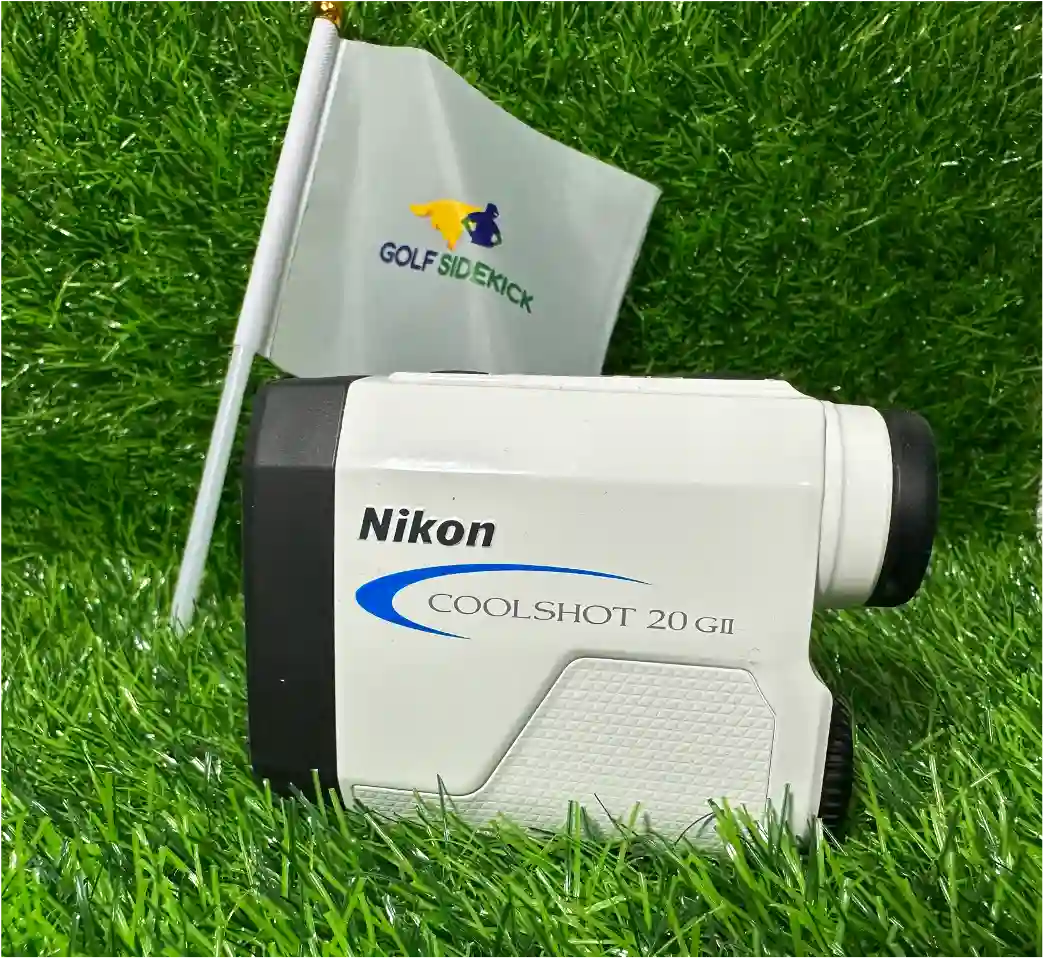
Nikon Coolshot 20 GII
Speed
Optics
Accuracy
The Coolshot 20 GII is a very simple to use point-and-shoot no frills rangefinder.
There is no slope function in this particular budget model, but Nikon have a Coolshot GII with slope function available.
Pro Bo Chalisa Lim on my Youtube channel uses this rangefinder and she is on the Thai LPGA. Here's what she says about the rangefinder.
"As a lady pro golfer, it's nice to have a small rangefinder for the size of my hands while playing practice rounds. The cheap price that fit in my budget of the Nikon Coolshot 20 rangefinder is the main reason I bought it. I like to put the rangefinder in my pocket when I wear shorts on the course and the Nikon is small enough to do that. Picking up targets inside 220 yards is easy."
Because it is so light and small, you need steady hands.
The reason you don't want the Nikon shaking around is that the crosshairs in the viewfinder struggle to pick up targets from over 160 yards with a lot of movement. The CR2 battery will last for about a year.
Cons
Best rangefinder for shaky hands
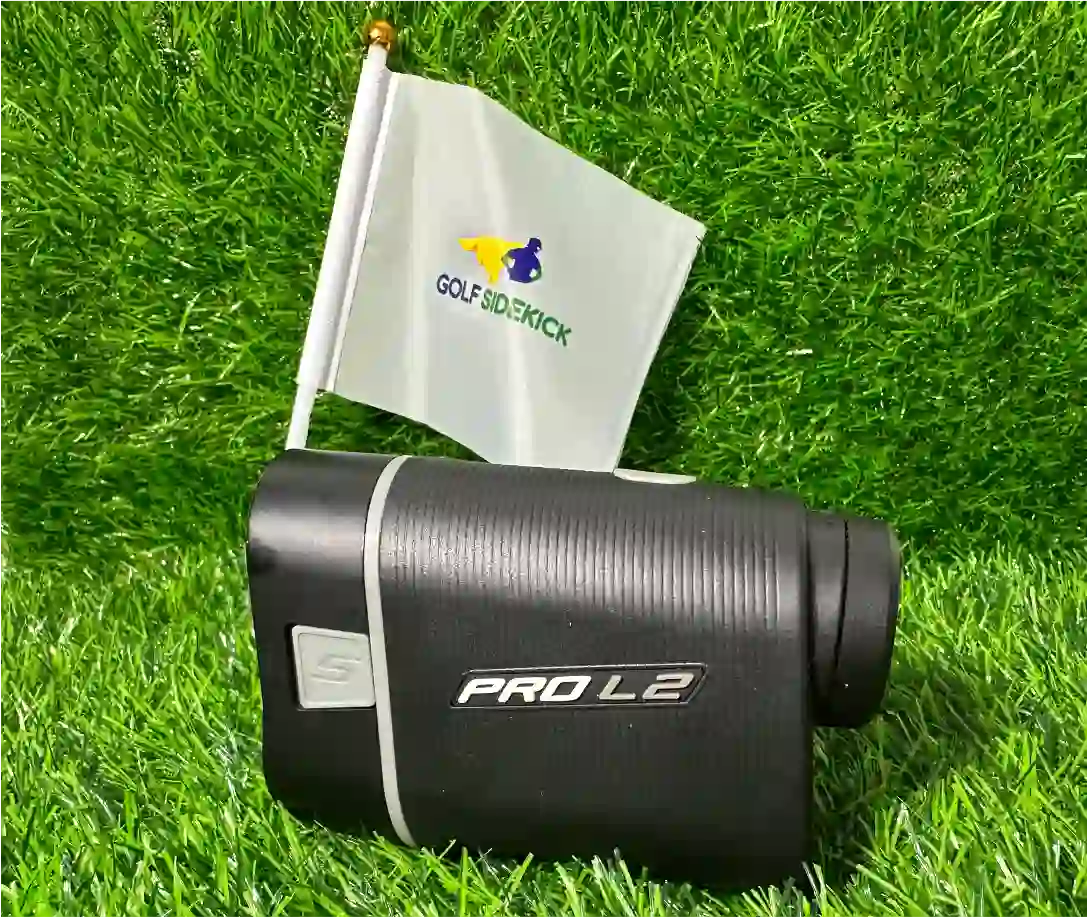
Shotscope PRO L2
Use code 'golfsidekick'
Speed
Optics
Accuracy
The Shot Scope PRO L2 Golf range finder is a medium-sized rangefinder with the external feeling of a very high-end model.
I used the Shotscope L2 Pro on a month-long trip to Scotland. My experience with it over 25 rounds of golf:
- Scanning mode where I held down the button was incredibly valuable to find distances as you move the view around the course
- The vibration when the rangefinder locks onto your target was one of the most reliable of the category
- In the windy conditions and with a lot of movement, the Pro L2 was able to pick up flags from inside 220 yards away.
- Slope function is reliable and gives consistent and accurate readings
- The case that you get with a Shotscope is excellent for travelling across the globe and my Pro L2 survived many flights
- Shotscopes styling is much better than the majority of budget rangefinder models
I got myself the grey model but there are more color options. i really like the blue trim. The fact that this rangefinder is so well made, and has slope functions, I cannot believe how low the price is.
The magnet on the side of the rangefinder is exceptionally strong. You could adhere the rangefinder to your wedges or the golf cart with no issue.
Overall, I would recommend the Shotscope L2 Pro to anyone upgrading from an off-brand rangefinder or anyone buying their first rangefinder. You will not go wrong.
Cons
Best value golf rangefinder
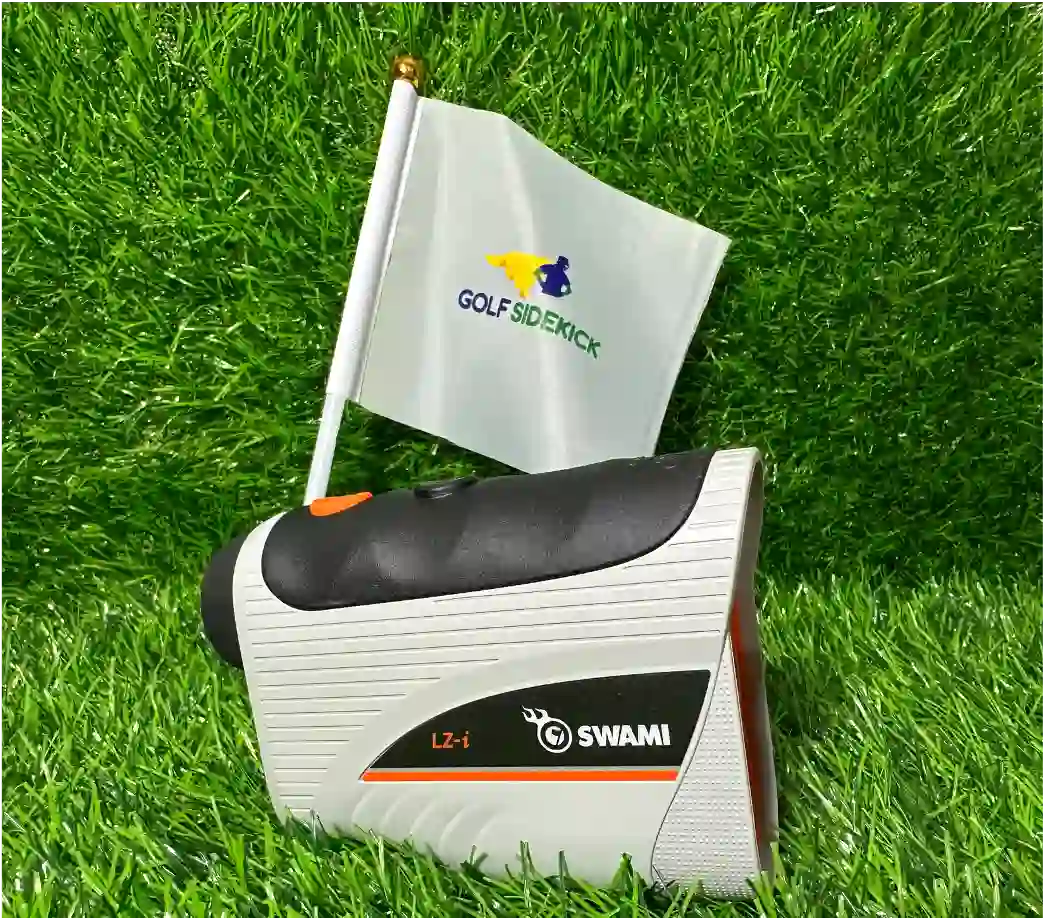
IZZO Swami LZ-i
Speed
Optics
Accuracy
I always liked the look of the IZZO Swami LZ-i and for the price, I had to buy one. This is hands-down the best value golf rangefinder on the market because I paid less than $100 for it but it feels like a $250 unit.
The feature that sets it apart from other rangefinders lies in the ability to suggest a club to you for the distance on screen. IZZO included the i-Caddie technology based on the 7 iron distance you select when you setup the rangefinder.
Other things we liked about the Swami LZ-i:
- A medium-small sized bullseye which means you can find targets from a longer distance
- Despite the low price, there is pin-lock technology to let you know that it found the pin
- The LCD light on the exterior makes it easy for your partners to see you're not using slope
- One of the best carry cases in the budget rangefinder category
- Bright colors so you will not forget it on the golf cart at the end of the round
The IZZO Swami LZ-i surprised us the most on the list. We were not expecting much but upon opening the box, we found the packaging and storage pouch different and classy. We liked that the Swami LZ-i can stand proudly on its own without trying to duplicate or replicate Bushnell in design.
The IZZO Swami LZ-i is the vest value yard per dollar golf rangefinder you can find currently.
Cons
Most compact rangefinder
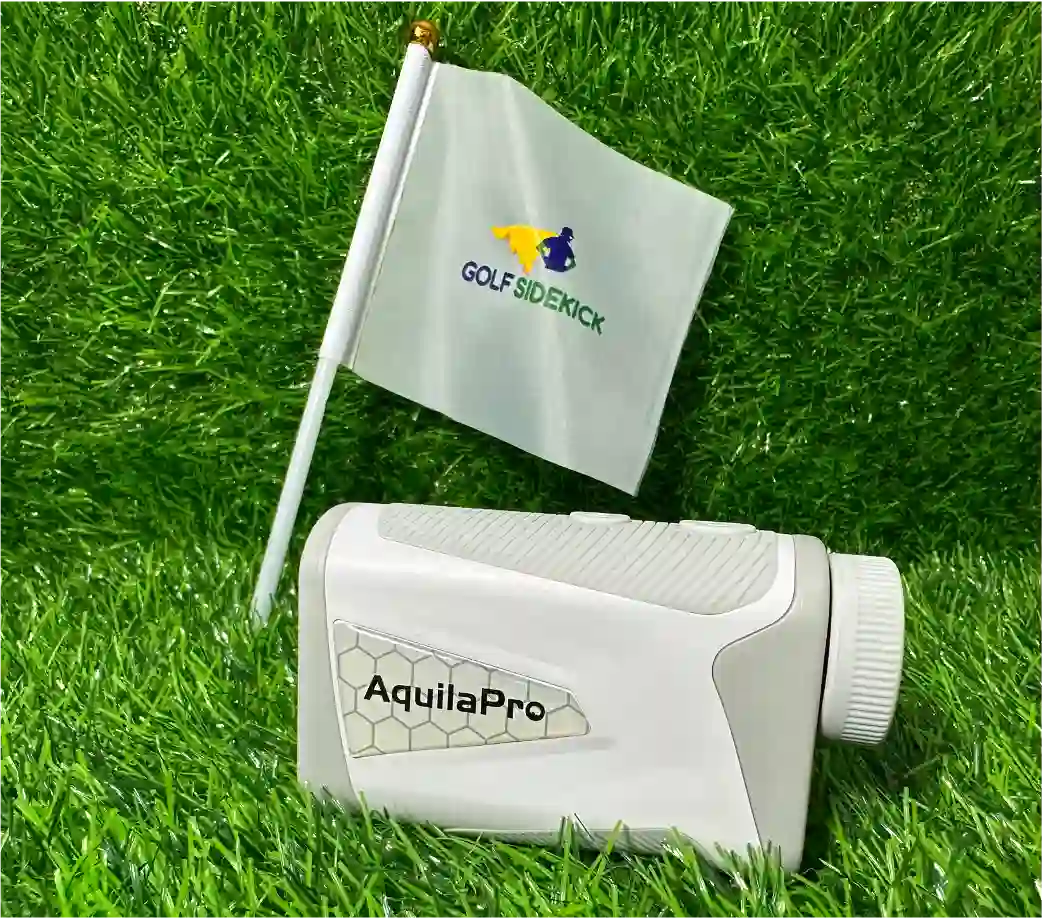
AquilaPro Mini 4
Speed
Optics
Accuracy
The Aquila Pro Mini 4 is the best compact budget golf rangefinder because it fits easy into the smallest hands, and it is so small you could place it in your pocket and not even notice the weight.
My experience with the Aquila Pro Mini 4:
- The Mini 4 is the smallest rangefinder I've ever used
- There are 2 decimal points in the reading which I do not prefer but at a price below $100, I can't complain
- The readings are surprisingly accurate and more important, consistent - I trust the readings
- The rangefinder is small so you may experience a little shakiness from long distance but it picks up the targets
- I tested the distance measured vs a Bushnell and the Aquila Pro Mini 4 is only 1-2 yards different
- There is slope and normal mode on the Mini 4 and again, the readings are surprisingly accurate and consistent
- The rangefinder is well-built and sturdy
- This little model fits in my pocket easy and comfortably which is my favorite part
- I'd rather have a CR2 battery rangefinder but this model has an internal rechargeable battery with a USB C type cable
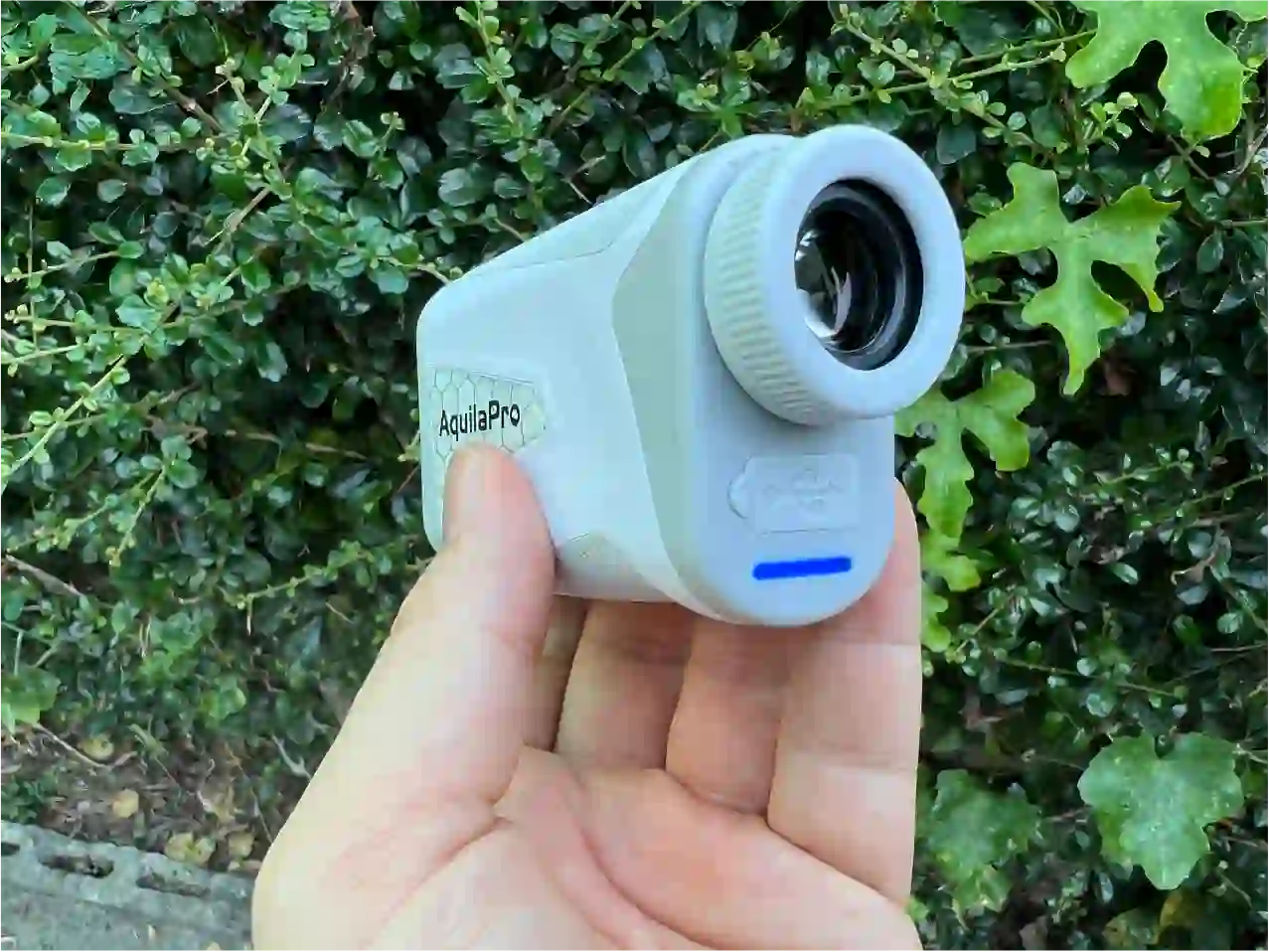
There are a couple of issues at this end of the market but nothing to do with the performance of the measurements.
The first gripe is that the protective case is terrible so purchase a different one after you receive the rangefinder. Before even using the rangefinder for the first time, the latch to close the pouch fell off.
One other weird one is the blue LED light that comes on right near your eye when you put slope mode on. I don't understand the logic of putting that aimed at your eye but I guess it shows your partners that you are using slope if you're in a tournament where it is not allowed.
Cons
- Two decimal points in the measured number
- LED light shines at you when you turn on slope mode
- The protective case is poorly made so you'll need a replacement before you even use it
Best cheap accurate rangefinder
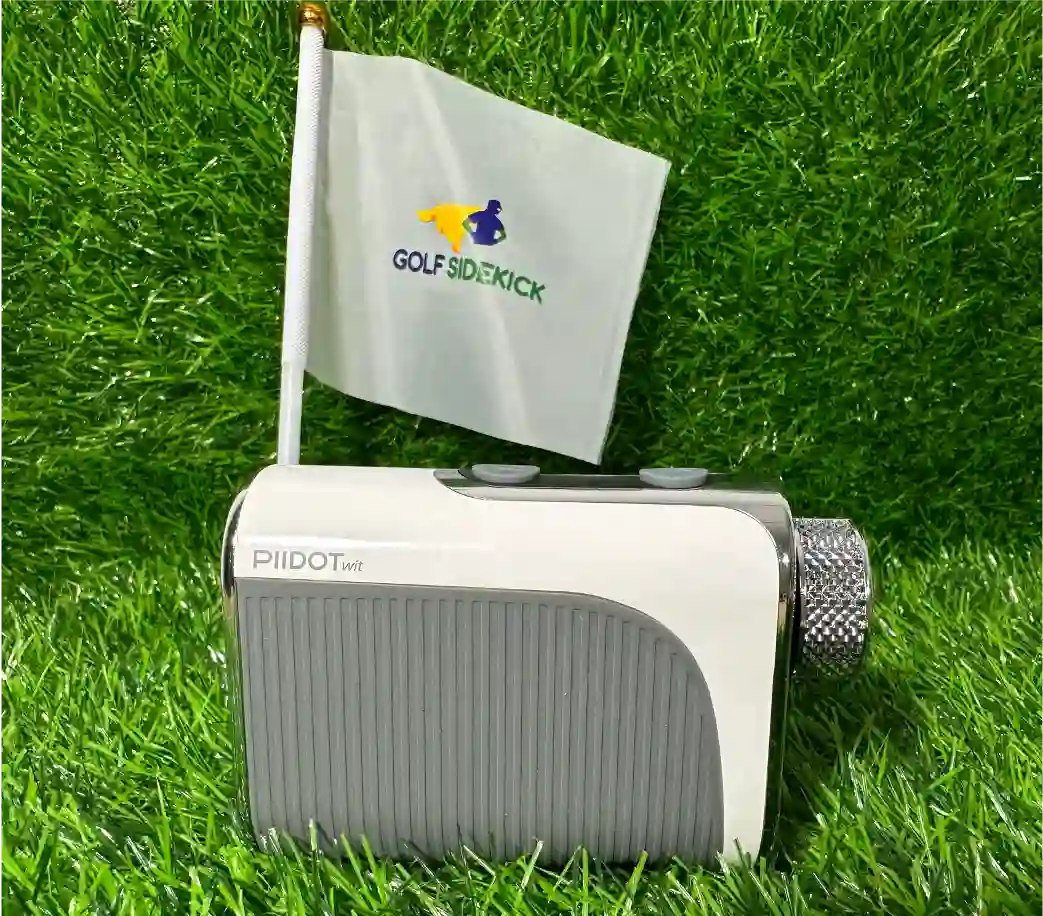
PIIDOTwit
Speed
Optics
Accuracy
The PIIDOTwit wins as the most accurate and quick rangefinder at the price point with one of the nicest exterior constructions in the category. Please note that you must use the cable PIIDOTwit provide you to charge the rangefinder on the first charge. I tried another USB C first but it did not charge, until I changed to the cable that was in the PIIDOT box.
What I like about the PIIDOTwit rangefinder:
- The bullseye makes it easy to find targets up to 200 yards.
- You change the slope function next to the viewfinder instead of holding down buttons which makes life easy.
- The Mode button on the top is exclusively to change between meters and yards and only with a click - no need to hold it down.
- You charge the rangefinder with USB so you don't need to replace CR2 batteries and the charge holds for a very long time.
- I like the sleek design with clean lines and smooth edges so dirt does not get trapped in the corners,
- The eye piece adjusts easily and feels like a high-end monocle.
- It is water and fog proof.
The PIIDOT remains one of the big surprises in the list. You immediately notice the attention to detail on the packaging and when you use the rangefinder, you notice how intuitive it is. A lot of budget rangefinders try add too many features but the PIIDOTwit is easy to change bwteen yards and meters, easy to switch slope on and off, and it tells you a distance.
We like products that perform a single function and this is one of the best for budget golfers. We would recommend a new case, because the case included is not very protective.
Cons
Best rangefinder for beginners
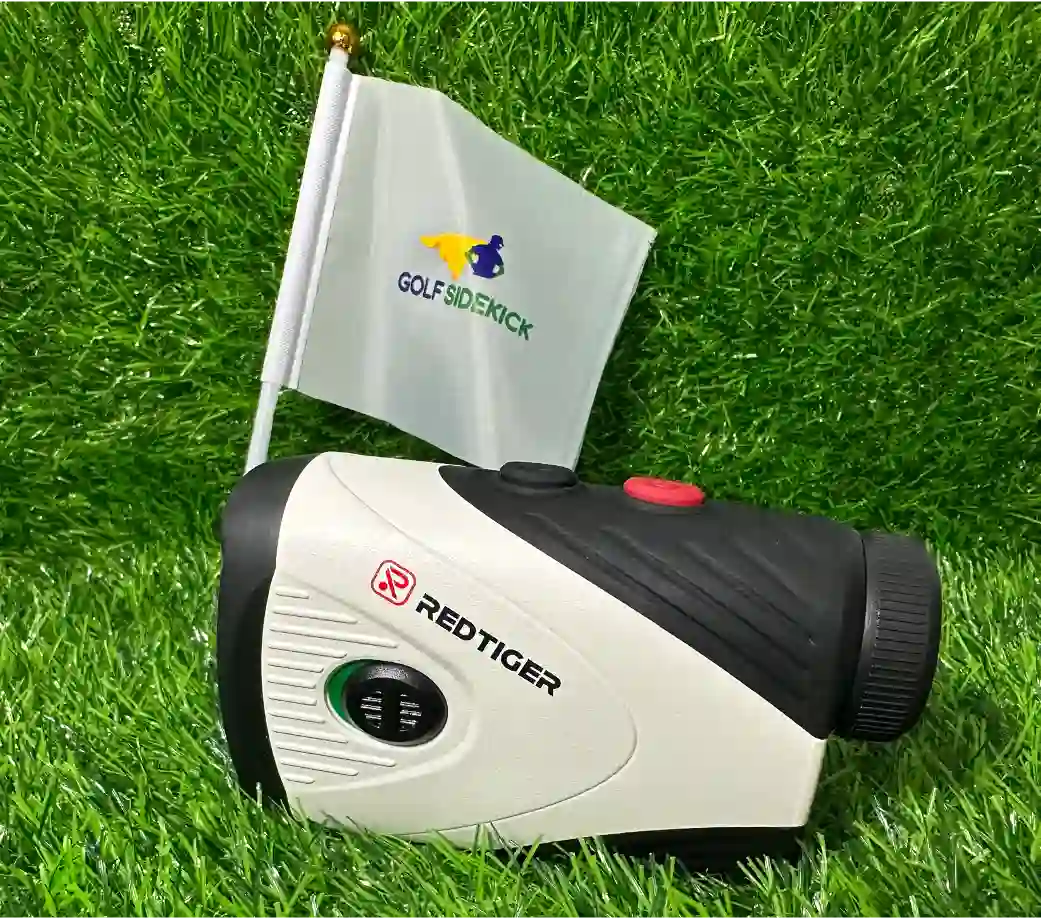
Red Tiger rangefinder
Speed
Optics
Accuracy
The Red Tiger will suit beginners because of solid construction and simple to use functions.
We like rangefinders to do only one thing but the Red Tiger also features a speed measurement option which we will never use. Besides that, the construction feels solid and the readings of the Red Tiger proved reliably accurate.
What we like about the Red Tiger rangefinder:
- Very sturdy construction and ergonomically designed for your hands
- Rubberized parts placed in the correct positions and this rangefinder works for even large hands
- The bullseye works fine but it took us a couple shoots to lock onto the flag from over 160 yards
- External slope switches definitely win and the Red Tiger's slope switch is on the left side of the unit
- The Red Tiger is a USB charged rangefinder and they include a cable in the box
- You receive a magnetic belt clip so you can stick the Red Tiger to you in between shots
- The protective case actually protects the rangefinder and feels very strong
The Red Tiger provides accurate distances when compared to every rangefinder in the guide. It sets itself apart from the other rangefinders with the quality construction. The rangefinder just feels solid, like if you drop it, it's not going to break. The buttons and the magnifying twist-adjustor feel high quality. Rubberized parts on the rangefinder are placed in the perfect position.
The Red Tiger is the best budget rangefinder for beginners because it's strong, simple and easy to use with no need to carry spare batteries because it's charge with a USB C cable.
Cons
Best budget rangefinder for big hands
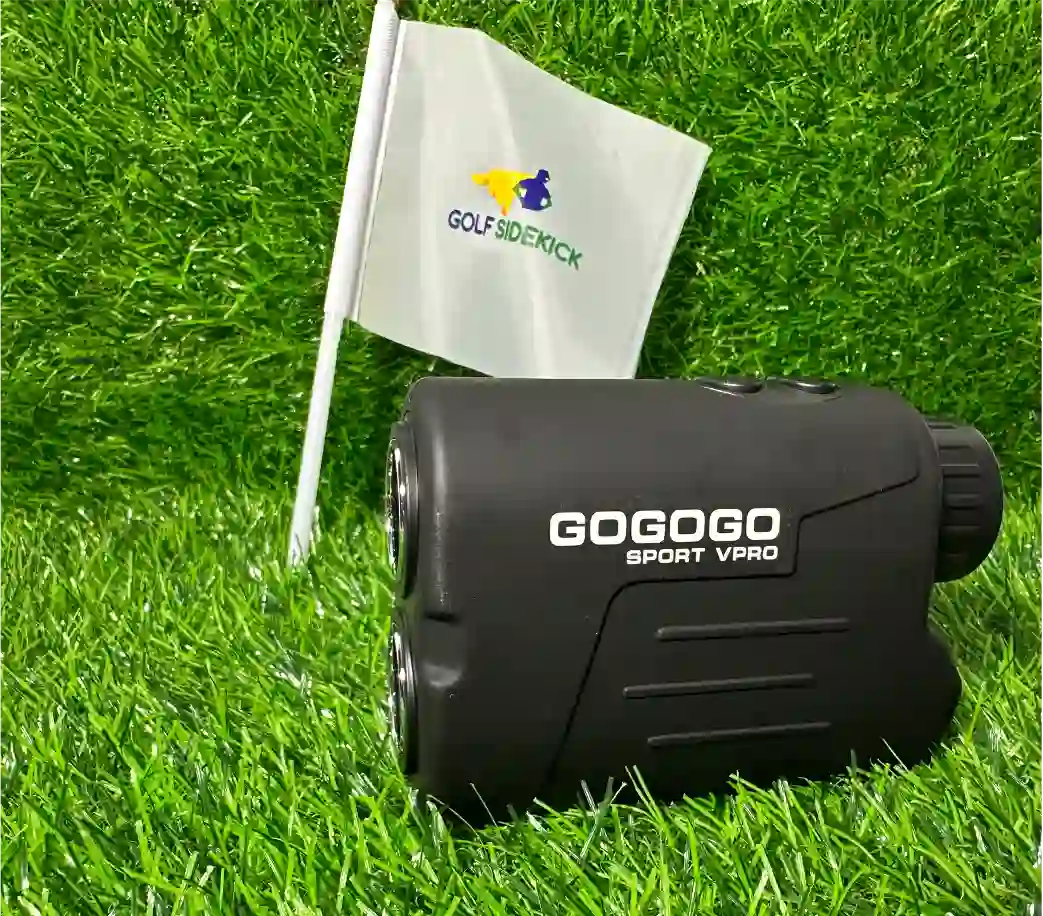
Gogogo Sport VPro
Speed
Optics
Accuracy
The Gogogo Sport VPro is the best rangefinder for big hands because it is large in size, with a wide profile. A lot of golfers with big hands complain about the instability of a small compact rangefinder but the VPro Sport is big.
Like we said in the Red Tiger review, we do prefer rangefinders that provide only distance measurements but the Gogogo also does the speed measurement. We do our best to ignore that unnecessary feature and focus on the distance measurements.
What we like about the Gogogo VPro Sport rangefinder:
- The exterior is coated in high grip material so it will not slip out of your hands
- Big, workman like hands will love the rangefinder because it is large
- Because the rangefinder is large, I found it easier to hold still over the target
- The bulleye of the Gogogo is a little large which makes it more difficult to zero in on the target without hitting background
- The Gogogo was within 2-3 yards of the Bushnell we compared it against
- Pressing down once on the flag mode makes the rangefinder vibrate when it hits the flag
- If you press down for a long time, the scan mode activates so the rangefinder tells you the distance to objects as you move around
We enjoy the slope function of the Gogogo and can overlook the speed measurement. Unlike the Red Tiger above, which also has a speed measurement, the Gogogo uses a CR2 battery and is not rechargeable with a USB cable.
You might prefer changing batteries once or twice a season rather than remembering to bring a charger. If you prefer using CR2 batteries, and you're between the Red Tiger and the Gogogo, get the Gogogo. It functions about the same.
Cons
Sleekest design budget rangefinder
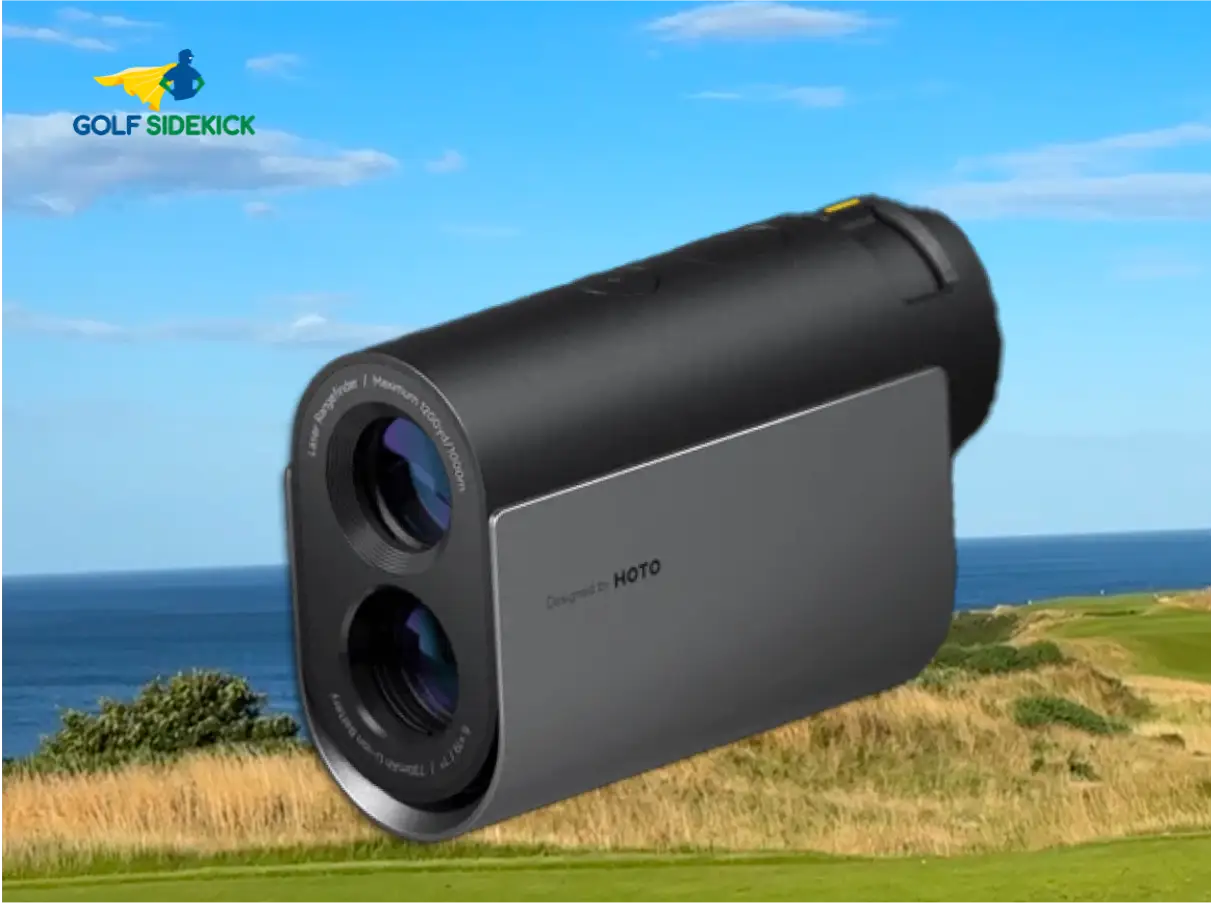
HOTO rangefinder
Speed
Optics
Accuracy
HOTO is a precision tool company that specializes in Xiaomi style, minimalist-design products. The HOTO rangefinder is a no frills, well constructed rangefinder that I would recommend to anyone who doesn't want to change batteries because you charge it with USB cables.
I own a HOTO and used it in this video for 9 holes:
My experience with the HOTO:
- Construction and materials are very solid with no rattling or loose pieces inside
- The eye relief is excellent even for myself who wears sunglasses to play
- There is a slider on top of the eyepiece which you can adjust the focus with and that is something I've not seen before
- There's a magnet on the side to stick it to the cart or to your wedge as you play for easy access
- Compact design means I can put the rangefinder in my pocket
- Where this rangefinder shines is that it can pick up small targets from over 200 yards away
Cons
Which budget golf rangefinders you should avoid
DO NOT purchase Milessey or TecTecTec products because we have used 3 models of each and every model has had one of the following problems:
- Low visibility in the viewfinder with poor lighting in the optics.
- Bullseye is too feint to see on the screen.
- Inaccurate readings compared to reliable rangefinders, often 10 yards incorrect.
- Switching off and not switching on erratically.
What is better: a budget golf rangefinder or a golf GPS watch?
At this price point, you have the option of a golf GPS watch and some other golf distance measuring devices. There are pros and cons to both. I suggest the rangefinder if you want to know the carry distance to many spots on a hole while I suggest a GPS watch if all you want to know is the distance to the front, back and middle of the greens.
GPS golf watch vs rangefinder features
| Feature | GPS watch | Rangefinder |
| Targets | Accurate to fixed points not decided by golfer | Precise yardage to whichever target you choose |
| Updates and downloads | Golf courses need to be updated periodically | No maps needed to be downloaded |
| Batteries | Recharge every 2 to 3 rounds | Batteries last for full seasons |
| Visibility | Unaffected by visibility conditions | Low visibility can slow down distance finding |
| Accessibility | Fit on the wrist or peak of cap | A bit chunky, better to attach to bag |
| Amount of info | Hands-free distances updating as you move | Manually point and shoot for distance each shot |
| Shot tracking | Sync with Apple or Android for data tracking | Only expensive Garmin Z82 |
| Tech knowledge needed | Need to be tech-savvy to benefit fully | Simple point-and-shoot, no frills |
| Line of sight | GPS doesn't need line of sight when you're way off reservation | Rangefinders need line of sight to the target |
So what's next?
Happy golfing and remember, a rangefinder is definitely worth the investment.
There's no need to go for the very expensive rangefinders when any of the above best budget golf rangefinders will do.
Avoid getting caught up in the Fear Of Missing Out wondering if you should get the fancy or the budget models.
At the end of the day, you need a rangefinder for one simple purpose and that is to provide a distance from where you stand, the the flag.
We own and have used every single rangefinder in this review. We excluded 15 unacceptable rangefinders as part of our quality control.

